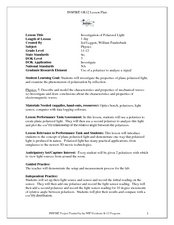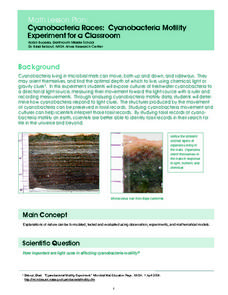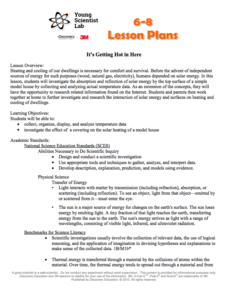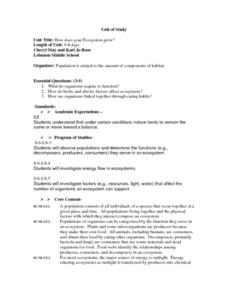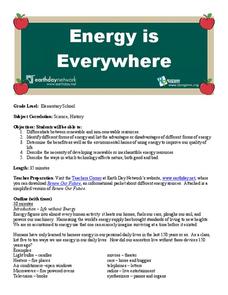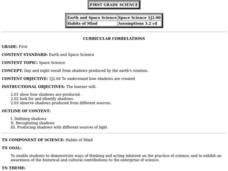Curated OER
Lighten Up!
Third graders observe light as a form of energy, that it can be reflected/bounced, refracted/bent and absorbed. They explore how different types of light affect our lives as a whole. Songs are researched that involve light (ex. "You...
Curated OER
Attenuation of Light in Water
Young scholars explore what happens to light intensity as depth increases using a light intensity logger. They construct a PVC model to hold water and identify what factors could influence the amount of light attenuation.
Curated OER
Physical Optics: The Wave Nature of Light
Students are introduced to the wave nature of light. In groups, they discuss Young's experiment and how diffraction and interference demonstrate the wave nature of light. Using examples, they show constructive and destructive...
Curated OER
Investigation of Polarized Light
Students investigate how polorizers filter light. In this physics instructional activity, students record their data and plot their results using a computer logging software. They discuss practical applications of polarization.
Curated OER
The Great Energy Debate
Students explore the controversial issues surrounding the energy debate in Canada. They research recent initiatives being taken in this area and analyze their implication. Students then assume the roles of pivotal stakeholders in this...
Curated OER
Sun, Sand, and Hippos
Students conduct research on varied aspects of hippopotamuses and in doing so, synthesize and evaluate a variety of information sources.They summarize content knowledge from varied resources and apply this knowledge by creating a mural...
National Wildlife Federation
I’ve Got the POWER! Solar Energy Potential at Your School
Should every school have solar panels? The 19th lesson in a series of 21 has scholars research the feasibility of using solar panels at their school. They begin by gathering data on the solar energy in the area before estimating the...
Curated OER
Cyanobacteria Races: Cyanobacteria Motility Experiment for a Classroom
Students experiment to determine the effect of light on cyanobacteria movement. They graph the data of the experiment for further analysis. They watch a time-lapse video of cyanobacteria motility at a NASA website.
Curated OER
A Matter of Survival
Fourth graders dance with inspiration from wild animals. In this creative movement lesson, 4th graders watch a video clip and then move like an animal might move in their natural surroundings.
Curated OER
Photo Synthesis and Transpiration
Students germinate pea seeds and plant the seeds. They experiment with different amounts of light and darkness on the plant growth.
Curated OER
Color and Spectrum
Learners examine the spectra of light sources that have similar colors. In this light lesson plan students complete an activity using various lights in the classroom and discuss the colors and the heat generated.
Discovery Education
It's Getting Hot in Here
Class members engage in a STEM experiment and investigate how materials affect heating in a house by creating models of houses and using different top surface materials. They record the temperature inside the models and consider what the...
K12 Reader
Waves & Currents
Challenge your young readers with a passage about physical science. After reading about sound waves and electric currents, kids answer five reading comprehension questions about what they have read.
Channel Islands Film
Magic Isle: Lesson Plan 1
What are the factors that limit growth and expansion? As part of their study of Catalina Island, class members view the West of the West's documentary Magic Isle and research William Wrigley and the Santa Catalina Island Company. After...
Curated OER
Floating and Falling Flows
Students discover fluid dynamics related to buoyancy through experimentation and optional photography. Using one set of fluids, they make light fluids rise through denser fluids. Using another set, they make dense fluids sink through a...
Curated OER
fun with Plants that We Use
Students become familiar with the products made from various plants. In this plants lesson, students experiment with natural dyes from plants. Students complete a list of things made from plants. Students answer questions about plant...
Curated OER
How Does Your Ecosystem Grow?
Students consider that under certain conditions in nature tend to remain the same or move toward a balance. They observe populations and determine the functions (e.g., de-composers, producers, consumers) they serve in an ecosystem. They...
Curated OER
Energy is Everywhere
Students differentiate between renewable and non-renewable resources and identify the different forms of energy and list the advantages or disadvantages of different forms of energy. They also determine the benefits as well as the...
Cornell University
Building Spectroscope
Given specific materials, scholars follow a set of instructions to build and calibrate their very own spectroscopes. After construction, they test the scope for accuracy and make modifications where necessary.
Curated OER
Day and Night
First graders study that day and night result from shadows produced by Earth's rotation. Students work to show how shadows are produced, look for and identify shadows and observe shadows produced from different sources.
Curated OER
Examining Spectra
Learners examine the spectra with the use of light while constructing their own spectroscope. They make observations about the colors and visible wavelengths of light and then conduct classroom discussions. As an extension students read...
Curated OER
Radiation: To Worry or Not to Worry
Students distinguish safe forms of radiation from those that are dangerous. Students watch a video about sources of radiation encountered every day. Students estimate their own annual radiation exposure.
Curated OER
Radiation: To Worry or Not to Worry
Middle schoolers distinguish safe forms of radiation from those that are dangerous. Students watch a video about sources of radiation encountered every day. Middle schoolers estimate their own annual radiation exposure.
Curated OER
Electricity: Series and Parallel Circuits
Fourth graders explore electricity and electrical circuits. They explore series and parallel circuits using Christmas lights. Students pull lights out of each strand of lights. They observe the results when the light bulb is pulled out....





